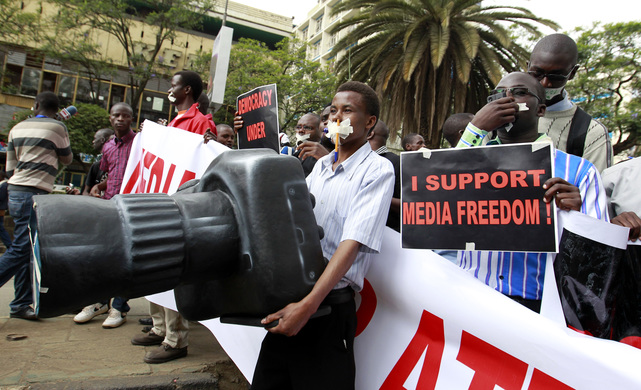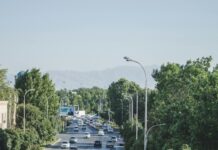PRESS STATEMENT BY MEDIA AND FREEDOM OF EXPRESSION STAKEHOLDERS
Nairobi, KENYA: August 3, 2017:
Media Industry and Freedom of Expression stakeholders have held a meeting in in Nairobi to review the electoral environment and the state of press freedom and freedom of information ahead of the General Elections due on Tuesday, August 8, 2017.
The stakeholders drawn from, among others, Kenya Correspondents Association (KCA), Kenya Union of Journalists (KUJ), and Association of Media Women in Kenya (AMWIK), Association of Freelance Journalists (AFJ), ARTICLE 19 Eastern Africa and Freedom House East and Horn of Africa, discussed the current political environment and media performance in covering the electioneering period and the status of freedom of expression in Kenya ahead of the elections.
They observed that the August 8, polls will be held within the context of heightened political campaigns and against the background of the highly contested 2007 General Elections which resulted in the Post –Election Violence during which more than 1000 people were killed and another 500,000 displaced.
They further noted that nearly ten years on, the key ingredients of the 2007/8 contestations have largely again manifested themselves leading to fears of a repeat of violence, which threatens Kenya’s fragile national fabric. Worryingly, a number of reforms and recommendations to address the grievances that led to the Post- Election Violence (PEV) mayhem have not been fully implemented as the polls approach on August 8.
The stakeholders recalled that sections of the media were blamed for fanning violence in 2007/8 period but recognized that significant efforts had been made by the media industry to address some of the gaps over the last ten years, including in the lead up to the coming Elections.
They noted that the media industry actors had consolidated efforts towards working together under the aegis of the Kenya Media Industry Working Group which had collectively worked towards developing election reporting guidelines, holding trainings on ethical and conflict sensitive reporting as well as putting in place frameworks for securing the safety and security of journalists.
The meeting noted that press freedom continues to be actively undermined by the state and its agencies, political actors and commercial interests. The media industry still faces a number of challenges, including unfavorable policy and legal framework, assaults and attacks on journalists by state actors that are neither investigated nor prosecuted, exploitative working environment for most journalists and cases of professional misconduct, including complaints of biased reporting by sections of the media.
However, the stakeholders emphasized that despite these challenges the media had remained robust, critical and had largely been covering the electioneering processes in a responsible manner and continues to exercise restraint and professionalism as we approach the elections.
Certainly, there are critical challenges still constraining the media’s capacity to offer the desired professional and impartial coverage of elections.
Call to the media industry, government, political actors and others players:
As the polling day approaches, the stakeholders wish to make the following call for action and commitment from various actors:
The media industry:
- Media owners and editors should exercise more responsible decision making and avoid taking patently partisan positions in the coverage of elections to avoid escalating political and other forms of conflicts during the polls and after. Partisan positions and leaning towards various candidates, including slanting stories from the field endanger journalists lives;
- Media managers and editors should offer adequate facilitation and support, including safety measures to journalists deployed to cover elections and at polling centers and into the post-election period, including insurance cover, transport, and safety gear where required. In previous elections some journalists have suffered indignity and been exposed to danger;
- Journalists should remain ethical and professional in their conduct and coverage of the polls and any emerging contestations in the post-election period to avoid escalating conflicts. Journalists should also exercise care to ensure they remain safe during the election period. Journalists should also be motivated by the need to inform Kenyans and should, therefore, avoid unnecessary self-censorship.
- Special consideration should be accorded correspondents (journalists who are not employees of media houses) who have unique needs and experience various challenges in reporting.
The Government and its agencies:
- The government should make a commitment to guarantee and facilitate press freedom as one of the key ingredients of holding free, fair and credible elections that will enhance national tranquility and cohesion; government functionaries should stop issuing statements that demean or undermine the role of the media;
- The police and other security agencies should provide security to journalists in their work and promptly investigate cases where journalists are attacked or threatened; The police deployed to manage security on election day and for the entire electoral process should act humanely and with restraint in dealing with any security breaches and also allow journalists the necessary freedom to access scenes and locations where they may require information to disseminate to Kenyans and the world. Unnecessary restrictions to journalists constitute censorship of the media and violate the constitutional principles of press freedom and access to information
- Government agencies including Communication Authority of Kenya, Ministry of ICT and National Cohesion and Integration Commission (NCIC) should stop issuing unnecessary edicts and threats to either limit what the media cover or shut down media outlets over their reporting of election results. The media and journalists understand the electoral law and will act within the law. But the media will not abdicate its responsibility to report the election process and update Kenyans on the voting, tallying and transmission process including the results of the elections as announced by officials of the Independent Elections and Boundaries Commission (IEBC) from different polling stations and tallying centers across the country.
- The government through the Communications Commission and other agencies should avoid the temptation to close down or interrupt social media during and after the elections as this will not only be a violation of the constitutional rights of citizens to freedom of expression and access to information but may have the potential of fomenting political and social unrest which may undermine the stability of the nation.
- The IEBC should manage the election process well to guarantee a transparent, free, fair and credible election that will engender peace. The Commission should guarantee journalists unfettered access to all polling stations and tallying centers and proactively facilitate timely information flow and updates to the media for the benefit of Kenyans and enhance the credibility of the electoral process and calm the country. The Commission should commit to allowing the media to update Kenyans on the voting process, the counting, tallying, results from transmission and announcement of the final results. The Commission must avoid the temptation to allow other government agencies to interfere with press freedom by purporting to ban the media from reporting the outcome of the elections from various centers as announced by the Commission’s officers.
- The Judiciary should sustain its assertiveness and independence in the adjudication of cases arising from the election results and speedily dispose of the cases to calm the anxieties and political contestations that may emerge. We add our voice to that of the Chief Justice who recently demanded that leaders of the main political coalitions respect the independence of the judiciary and stop profiling and intimidating judicial officers in particular judges.
Political Parties and leaders and supporters:
- Political parties, their leadership, and followers should promote press freedom and stop threats and attacks on journalists on duty during their functions and through statements;
- Politicians/parties should restrain their supporters from attacking or threatening journalists. A number of cases have been recorded where supporters of various parties have threatened or attacked journalists;
- Political leaders and parties should tone down their negative rhetoric and use of the media to communicate negative messages and statements that may harm national cohesion and integration;
The stakeholders wish to urge all key actors and Kenyan citizens to support and enhance press freedom and access to information as an important component of deepening democratic governance and national unity.
Signed:
Kenya Correspondents Association (KCA) – William Oloo Janak – Chairman
Kenya Union of Journalist (KUJ) – Eric Oduor – Secretary General
Association of Media Women in Kenya (AMWIK) – Marceline Nyambala – Executive Director
Association of Freelance Journalists (AFJ) – Winnie Kamau – President
ARTICLE 19 Eastern Africa – Henry Maina – Director
Freedom House East and Horn of Africa – Morris Odhiambo, Regional Project Director














